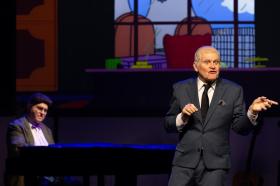Sir Humphrey knew how to manage the Minister in the BBC series Yes Minister.
Addressing the Australian Performing Arts Centres Association (APACA) annual conference in Hobart on Wednesday, former head of Arts Queensland and author of the Platform Paper It’s Culture Stupid: Reflections of an arts bureaucrat, Leigh Tabrett advised delegates that one of the best ways to ensure optimal outcomes for the sector was to change the ways politicians think about the arts. But doing so would require more than presenting them with facts and statistics, she cautioned.
‘Why is it that all Australians know that arts and culture are exciting and important in their their lives … [and] you can show it in factual terms, statistical terms, but ministerial advisors and politicians for some reason find it really hard to swallow?’ Tabrett asked.
Politicians were not necessarily hostile towards the arts, she explained, but a range of factors meant that they did not necessarily grasp the value of culture, and no amount of statistical data would change that.
‘There’s very good research that core beliefs and expectations are more powerful than any evidence you can provide,’ Tabrett said. ‘We know, for example, that the vast number of boat people are legitimate refugees but is anyone paying attention to that piece of information?’
The big challenge for the sector was to challenge and help change the deeply held beliefs of politicians and other people in power, she continued.
‘Change occurs not through telling, not through data and analysis, but through experiencing insight … If you focus on economic measure you won’t be growing your cultural contribution. Focus your attention on the things that matter.’
Creating opportunities for insight was required, Tabrett said. ‘Emotion is the most powerful tool … The magic thing here for the arts is that we have, in our hands, the very tools that make change. So, create opportunities for insight. Involve your Minister, or your Minister’s grandchildren, in things that make them happy, that produce a flow of dopamine, make them feel blessed to be part of it.
‘Minimise risk. I’ll tell you a story about the Minister who mispronounced a very common arts word in a parliamentary speech and was lampooned in the local media for about a week, and by his opposition colleagues for about a month. What do you think that did for his attitude toward the arts? It never occurred to us that we needed to spell out, to actually give him the pronunciation of that particular word.’
She also advised arts workers to ensure that politicians felt secure and welcome in their interactions with the sector. ‘And I’m not talking about sucking up to them as Minister. I’m actually talking about making a genuine connection with their interests, family interests – is there a child or grandchild who’s a musician? Really paying attention to them as human beings rather than that rather stereotypical thing we do: “Oh God, it’s another bloody Minister, do I really have to put myself through this?” Those connections will pay you back in spades,’ Tabrett explained.
Being attentive to a politician’s personal needs was also valuable, she continued. ‘I watched a gallery director assiduously ply a Minister with beautiful books, beautiful opportunities, invites to beautiful events, and nothing paid the arts sector back better than that paying attention. Over a period of time it was good for everyone, not just good for the gallery.’ Giving your Arts Minister a sense of connection by introducing them to philanthropists and influential members of your Board was also valuable, she said, as it generated a sense of social reward at the neurobiological level.
‘And then my last message is to go for the heart. Its actually the key change muscle. And this is perhaps a surprising thing to say. To me it’s not about measurement, it’s not about you having to do all of those things competently, but the thing that will change how people see you, and see us, is that connection with the heart. The best example I can give you of this is the stuff that fundraising organisations do
‘What’s the hardest gig in the world? Taking money out of a person’s pocket and putting it in your cause. But Australians give millions every year. Why do they do that? Because you see this thing which says “20 million children in the world exist without clean water; here’s little Soraya – you can give her a clean water supply.” And what do we do? We put our hands in our pockets for that.
‘Never a stat without a story. And you are masters of storytelling. And this is to me the important message … go for the thing that we do best. Transform lives, as many as you can, and include the Minster and your public servants in that group, and in the end, the measurement and the support and the value will be easy, the value will be recognised, and the change will happen.’
The APACA Conference Harvest 2014 continues in Hobart until Friday 4 July.





